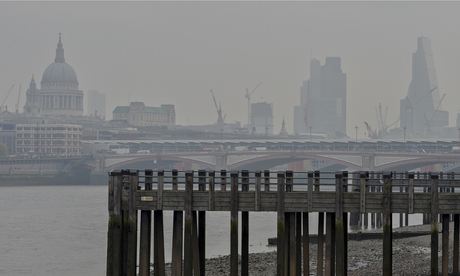
The City of London shrouded in smog. 'Slowly, it is dawning on people that the risks from air pollution are far greater than previously thought or understood.' Photograph: Barcroft Media
TheGuardian.com: Blame the Sahara desert for the present air pollution. Blame Europe. Blame climate change – or even the spring sunshine, or the hole in the ozone layer. But if you are in government please don't mention the fact that the toxic air much of Britain has been breathing is mostly of our own making.
Don't look on the front page of Defra's website for an explanation of its composition, or expect ministers to admit this is a public health emergency. And certainly don't expect local or central government to take action, such as reducing car numbers in the streets or closing down factories. That's what the Chinese and French governments do when the air in their cities is unbreathable and their people are choking. Not us.
What we are not being told is that the milky, hazy skies shrouding southern Britain are the result of tiny particulates, or aerosols, that scatter sunlight and come from our own traffic, power stations, farming, construction sites, central heating boilers and industry. Our own bad air is mixing with pollution drifting in from mainland Europe and a bit of Saharan dust, picked up by unusual weather conditions that have trapped the foul mix over a wide area. It will take until Thursday at the earliest before westerly winds begin to disperse it, the Met office says.
But the results of this will be seen over the coming months as hospitals report increased admissions from people suffering respiratory diseases, strokes, heart attacks and worsening lung conditions. Last year, according to the government's own figures, more than 29,000 people died prematurely from air pollution in Britain, with 4,300 in London alone.
But premature death is just the tip of the iceberg. In the short term, polluted air leads to irritation to the eyes, nose and throat, headaches, nausea, bronchitis and pneumonia; and over a longer period it results in heart attacks, lung diseases, cancers, and damage to the brain, nerves, liver, and kidneys. We now know that children living near busy roads can show reduced lung capacity by the age of five, and that the poor are most affected as they live in the most polluted areas.
Slowly, it is dawning on people that the risks from air pollution are far greater than previously thought or understood. Last week, the extremely cautious World Health Organisation revised its figures and reported that nearly one in eight of the world's deaths – more than 7 million people a year – are now the direct result of air pollution, and that for every person who dies, there are many more whose health is impaired long term. Put bluntly: every year air pollution kills more people than Aids, smoking, road accidents and diabetes combined, and is the world's single biggest environmental health risk.
Last week, even as Paris banned some traffic to reduce air pollution, London played down the problem, even though our air was just as polluted. London's mayor, Boris Johnson, has several times warned the vulnerable to avoid outdoor exercise, but he is accused of doing virtually nothing to reduce the causes of pollution. As the London assembly member Jenny Jones, Friends of the Earth and others point out,Europe's most polluted major city has no emergency plans to deal with air pollution and no powers even to restrict traffic during periods of smog.
Central government, too, has tried to wash its hands of the problem although it knows that air pollution is costing the NHS billions of pounds a year, and that the supreme court has ruled that the state has a legal duty to protect us from it. Last month the EU finally, after 15 years of warnings, extensions and postponements, launched legal proceedings against Britain for failing to reduce "excessive" levels of air pollution. The government now faces fines of £300m a year, but we can expect it to try everything to reduce pollution – bar restricting traffic.
The need to clear the air is just as great today as in the 1950s when peasouper smogs killed thousands. In 1956 a brave government passed the first Clean Air Act that banned coal burning and reduced pollution spectacularly. Today we have the laws from Europe that would do the same, but no government seems prepared to implement them.
[So what is the best solution? A switch from ICE to EVs of course! Now we need to see local and central government work together to make a real difference.]